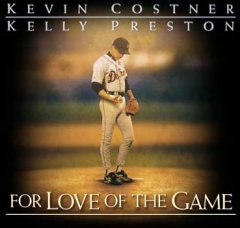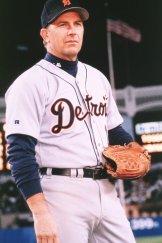 Starring
Kevin Costner, Kelly Preston, John C. Reilly, Jena Malone, Brian Cox.
Starring
Kevin Costner, Kelly Preston, John C. Reilly, Jena Malone, Brian Cox. Written by Dana Stevens.
Directed by Sam Raimi.
 Starring
Kevin Costner, Kelly Preston, John C. Reilly, Jena Malone, Brian Cox.
Starring
Kevin Costner, Kelly Preston, John C. Reilly, Jena Malone, Brian Cox.
Written by Dana Stevens.
Directed by Sam Raimi.
Grade: B-
Review by Carlo Cavagna.
What is it about Kevin Costner in a baseball uniform? He hasn’t had a lot of success playing non-sports characters not named John Dunbar. But, somehow, when they put a white ball in his mitt, he becomes the All-American hero–and not a bad actor to boot. In Field of Dreams, he became a symbol for all that “once was good about America.” In Tin Cup, where he played a golfer instead of a baseball player (big difference), he was self-absorbed and bull-headed, and yet we rooted for him anyway, because he was the ultimate underdog. In Bull Durham, he exuded folksy charm as Crash Davis, and women swooned. How long has it been since women actually swooned over Kevin Costner?
Forty-year-old Billy Chapel (Costner’s character in For Love of the Game)
and Crash Davis are opposites. Yes, they are both over-the-hill ball players.
But where Crash Davis was a washed-up career minor leaguer, Billy Chapel is
a not-quite-washed-up-yet longtime major league star. Crash Davis was a grizzled
veteran catcher with a thing or two about life to teach his young pitchers.
Billy Chapel is an grizzled veteran pitcher with a thing or two about life still
to learn. And while Crash Davis wore his emotions on his sleeve, Billy Chapel
tries to keep them bottled up inside. 
The premise of For the Love of Game is this: The baseball season is drawing to a close. The owner (Brian Cox) of the losing Detroit Tigers is about to sell the team, and the new owners are anxious to dump high salaries. Billy Chapel, a life-long Tiger in the twilight of his career, has a choice of being traded to another team or retiring. Over the course of his last start of the season, Chapel ponders his decision and finds himself reflecting instead on the history of his bumpy relationship with Jane Audrey (Kelly Preston). By the eight inning, Chapel suddenly realizes that he has a chance to pitch a perfect game. For those of you that don’t know, a perfect game is the rarest single-game event in baseball. A perfect game means a complete game with no hits, no walks, no errors, and no hit batters. In the words of the Baseball Almanac, it is “the masterpiece of a career, the pinnacle of the pitching aspect and one of the most difficult feats to achieve in the entire game of baseball.” There have been exactly fifteen nine-inning perfect games in the entire 100+ year history of baseball (sixteen counting the playoffs).
Of course, the game is an allegory for Chapel’s life, and to me, there could be no better concept for a baseball movie–framing the events of a man’s life with the events of a single game. The game echoes Chapel’s life, comments on the choices he has made, and in the end, points the way to the future.
The idea of For Love of the Game is fantastic. Unfortunately, the actual screenwriting is often banal. The conversations are unremarkable, especially since most of us have already heard all the best lines in the previews and Coster’s shy stud routine is not exactly fresh. Many of the emotional peaks are hackneyed. The dialogue between the game and Chapel’s memories is poorly paced. The flashbacks are overly long, and by the end of each one, we have forgotten that we’re still in the middle of a baseball game, and so we lose track of the analogy between the game and Chapel’s life.
Sam Raimi’s direction saves the film. As in A
Simple Plan, Raimi unveils an unexpectedly low-key style after a making
a slew of over-the-top horror/action movies. Not only that, Raimi seems to understand
that he has been saddled with a derivative script. Whenever a moment is in danger
of seeming predictable, sappy, or overwrought, Raimi steps back even further.
For example, at one point during the ball game, Chapel massages a nasty scar
on his pitching hand. A flashback begins, and we see Chapel working with a saw.
We cringe in anticipation. Yet, precisely because what’s coming is so obvious,
Raimi denies it to us. Instead, in a scene that could be taken from A Simple
Plan, we next see Chapel staggering toward Jane in the snow with a bloody
arm. A better example is a scene where Chapel cries. Costner crying, you ask?
Yeah, right. But the understatement of the scene makes it real. Most importantly
of all, at no point during the film are we subjected to the falling-in-love-by-musical-montage
device. 
The best parts of For Love of the Game are the scenes in the game itself. To many, baseball is just boring. Those of us who love baseball already understand the nuances of this seemingly simple game, but Raimi does a good job of making the psychological confrontation between pitcher and batter come to life for any viewer, partly by having Chapel mutter his inner monologue to himself so that we hear what he’s thinking. However, Vin Scully’s play-by-play commentary is overdone–probably the only thing in the movie that can be characterized as “too much.” Scully runs out of things to say well before the end of the game, and by the ninth inning he is just repeating things that are already obvious to any viewer with half a pulse.
As Costner baseball movies go, For Love of the Game is not as funny as Bull Durham or memorable as Field of Dreams. Similarly, Kelly Preston, an average actress, is no Susan Sarandon. Preston’s main asset is that she can play ‘pretty-but-awkward’ well. But, if you liked Costner’s earlier baseball efforts, as I did, chances are good that you’ll like this one.
I’ll close with a minor statistical quibble that will likely be of interest only to baseball fanatics: Chapel enters his final start of the season with a 3.11 earned run average (ERA), which is way too low for a forty-year-old pitcher with a losing record (8 wins, 11 losses in this case) in today’s scoring-happy American League. A 3.11 ERA essentially means that Chapel has been pitching extremely well but has been losing because his team scores very, very few runs. Chapel’s performance in what may be his final game would have been more eloquent had Chapel been having a mediocre season up to that point. But it is eloquent nonetheless.
Review and analysis © September 1999 by
AboutFilm.Com and the author.
Images © 1999 Universal Studios.
Send us a comment on this review. We'll post a link to the best comments!